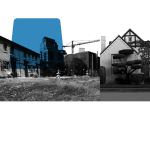If the San Francisco Bay Area is a gentrification beast, then Alameda County is in the belly of it. Rents continue to rise while landlords seek ways to push out tenants and make room for new development. As gentrification persists, Alameda County has experienced a surge of evictions.
Evictions play a key role in displacement and racial segregation. During the Bay Area’s “tech boom” between 2005 and 2015, about 32,402 families were evicted in Oakland, the Alameda County seat.[1] By 2014, the city had lost 4% of its black population.[2] The changes in Oakland’s demographics are no surprise in light of the disproportionate impact of evictions on people of color. Several studies now show that African American women are significantly more likely to be evicted than others.[3]
Oakland is experiencing phenomena common to urban areas throughout the country due in part to the racial and economic implications of an unbalanced eviction system. By examining the effects of housing instability on health, the Alameda County Public Health Department (ACPHD) is confronting these phenomena head on.
Gentrification and evictions have uprooted communities like Oakland by forcing some families to move far from friends, family, and jobs, while pushing others into homelessness.
But to truly tackle gentrification issues, local government, including ACPHD, must also address the systemic racial and economic inequities tied to the civil court system. Access to meaningful representation for low-income families is part of a comprehensive and integrated public health strategy. ACPHD, and other groups doing this work, should explore the right to counsel in eviction cases as a tool to preserve communities and improve public health.
As Matthew Desmond explores in his Pulitzer-prize winning book Evicted, the court system weighs heavily in favor of landlords. Ninety-five percent of landlords go to court with a lawyer, and 90% of tenants go without one.[4] Not surprisingly, eviction case outcomes are based on whether a tenant is represented by an attorney.
One Massachusetts pilot program provided a right to counsel in eviction cases and confirmed that vulnerable tenants that do not have a lawyer during the eviction process “forfeit important rights, lose possession they could have retained, and forego [sic] substantial financial benefits.”[5] Initial data from a similar pilot program in California showed that families who are represented by an attorney during eviction experience a range of physical and financial positive outcomes, including the right to remain housed.[6]
An additional significant benefit of providing tenants with access to justice in eviction cases is that it will free up funding for other public health initiatives. A survey in New York City identified eviction as an immediate cause of homelessness for more than one-quarter of families in the shelter system.[7] The city estimated that it could save more than $320 million per year by providing attorneys to low-income families. It subsequently passed a local right-to-counsel law that will help tenants avoid illegal and unjust evictions and benefit the city by saving on the cost of homelessness.
Gentrification and evictions have uprooted communities like Oakland by forcing some families to move far from friends, family, and jobs, while pushing others into homelessness. And ACPHD has identified a public health strategy that includes policy advocacy to preserve housing for poor and working-class communities in Alameda County’s thriving cities. Indeed, policies like just-cause evictions and landlord harassment prevention will help slow the alarming rate of evictions and support stable communities.
But providing legal representation to poor families of color is an important next step. It can slow the effects of gentrification and foster sustainable communities. By viewing housing through a public health lens, it becomes clear that access to justice is part of an integrated, evidence-based strategy to reduce displacement and improve public health outcomes.
[1] Counterpoints: Stories and Data for Resisting Displacement, 2016. Anti-Eviction Mapping Project.
[2] Counterpoints: Stories and Data for Resisting Displacement, 2016. Anti-Eviction Mapping Project.
[3] Desmond, Matthew. “Eviction and the Reproduction of Urban Poverty 1.” American Journal of Sociology 118.1 (2012): 88–133.
[4] Desmond, Matthew. Evicted: Poverty and profit in the American city. Broadway Books, 2016.
[5] The Importance of Representation in Eviction Cases and Homelessness Prevention, Boston, 2014
[6] http://www.courts.ca.gov/documents/shriver-20151214-materials.pdf
[7] https://d3n8a8pro7vhmx.cloudfront.net/righttocounselnyc/pages/23/attachments/original/1481217027/RTC_FACT_SHEET.pdf
Deborah Thrope is a member of the BLOCK Project’s Community of Practice and a Supervising Attorney at the National Housing Law Project (NHLP).

